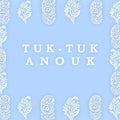About our fabrics
Tuk-Tuk Anouk made a name for itself using the block prints and khadis of Jaipur. Starting out with creating flora block prints based on the age old patterns of the Pink City, we have expanded in to animals, trees, stars and wildlife! Our block prints start off as a drawing by Amber Grey. These are then carved individually into Sheesam Wood (known as indian rosewood) a slow growing but durable tree native to the North Indian region famous for this nearly two thousand year old art form. These blocks are then sent to our fair trade fabric units where they are dipped into AZO free dyes and hand stamped on to fabric.
Each colour used in our drawings has to be carved individually and stamped individually onto our cottons. Our multi flora print requires seven individual stamps!
Our khadi cottons are hand woven in villages dotted around Rajasthan and Tamil Nadu. Khadi is a sometimes confusing word: it is in fact the name of a movement and not a fabric. Created by Gandhi as a way to promote self sufficiency in rural communities in India, khadi products include not only hand woven cottons, wools and silks, but body products, honey, herbs and amulets. We occasionally find some incredible hand made treasures buried within the rooms of our khadi warehouses.
Our khadi cloth has never been touched by electricity. From the cotton planting, to watering, to picking, cleaning, processing, weaving, dying and designing, every step is done by hand. This creates a cloth that carries the mood of the weaver, the weather they sat to weave. Their story is in each piece of our fabrics and by using khadi we are directly supporting their families and communities.
The benefits of using block prints and khadis is that the fabrics tell a story, they are not machine perfect and as so many hands are needed to create them, many people are supported with their creation.
